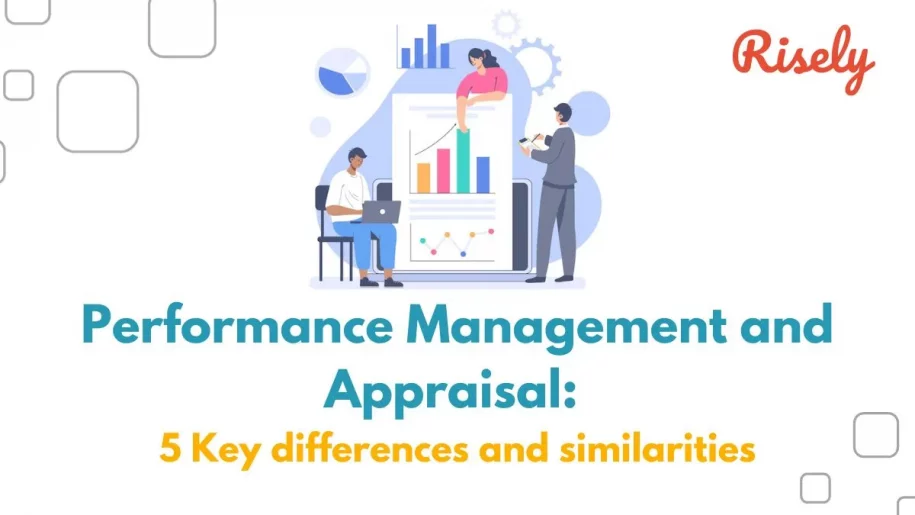Performance Management and Appraisal: 5 Key differences and similarities
Performance management and appraisal are terms often used interchangeably but do not mean the same thing. Performance management is a continuous process of setting goals, assessing progress, providing feedback, and improving employee performance. On the other hand, performance appraisal is a periodic evaluation of an employee’s job performance against predetermined criteria. Understanding the differences and similarities between performance management and appraisal is crucial for any organization that wants to maximize its employees’ potential. In this blog, we will dive deeper into what performance management and appraisal mean, their key differences and similarities of performance management and performance appraisal, how performance management leads to appraisal, examples of effective performance management and appraisal, and best practices for implementing them in your organization. Whether you’re an HR professional or a manager looking to improve your team’s productivity, this blog will provide valuable insights.- Performance Management and Appraisal: 5 Key differences and similarities
- Definition of Performance Management
- Definition of Performance Appraisal
- Differences Between Process of Performance Management and Performance Appraisal
- Similarities of Performance Management and Performance Appraisal
- How Performance Management Leads to Appraisal?
- Best Practices for Effective Performance Management and Appraisal
- Conclusion
- Other Related Blogs
Definition of Performance Management
Performance management is a continuous process that involves setting goals, monitoring progress, and providing feedback to improve employee performance. It is a strategic approach to managing and developing employees to achieve organizational goals. The activities involved in performance management include goal setting, performance reviews, coaching, and development programs. By aligning individual performance with company objectives and promoting employee engagement, performance management ensures that employee contributions are measured and evaluated.Definition of Performance Appraisal
Performance appraisal is a formal process that assesses an employee’s performance against predetermined criteria. It involves reviewing past performance, providing feedback, and setting goals for future growth. Typically conducted annually or at regular intervals, it serves as a basis for making decisions regarding promotions, salary adjustments, and career development. This process helps identify areas for improvement and recognize outstanding performance. Performance appraisal is vital in aligning employee goals with company objectives and ensuring continuous improvement.Differences Between Process of Performance Management and Performance Appraisal
Performance management and appraisal are two related but distinct processes within human resource management. While both focus on evaluating and improving employee performance, they have different objectives, methods, and timelines. Here are the key differences between the two:- Purpose and Objectives:
- Performance Management: Performance management is a continuous and ongoing process that aims to improve employee performance and development. It focuses on setting clear goals, providing feedback, coaching, and aligning individual and team efforts with organizational goals. The primary goal is to enhance employee performance and productivity.
- Performance Appraisal: Performance appraisal, often called a performance review or evaluation, is a periodic and formal process that assesses an employee’s performance against predefined objectives and standards. The primary purpose is to make decisions regarding rewards, promotions, and career development.
- Frequency:
- Performance Management: It is an ongoing process throughout the year. Managers and employees engage in regular discussions and feedback sessions to track progress and make necessary improvements.
- Performance Appraisal: It typically occurs annually or at specified intervals (e.g., semi-annually or quarterly), with a formal evaluation of an employee’s performance over a set period.
- Nature of Feedback:
- Performance Management: Feedback in performance management is continuous and constructive. It focuses on coaching and guiding employees to improve their skills and abilities.
- Performance Appraisal: Feedback in performance appraisal is often more formal and can include a rating or grading system. It may highlight areas of strength and weakness, focusing on assessing past performance.
- Documentation:
- Performance Management: While some documentation may be involved, the emphasis is on the development and improvement of employees. Documentation may include goal-setting documents, coaching notes, and performance improvement plans.
- Performance Appraisal: Documentation is a significant part of performance appraisal. It includes written evaluations, ratings, and records of achievements or shortcomings that may impact compensation, promotions, or disciplinary actions.
- Focus:
- Performance Management: Focuses on the future and how to enhance performance through coaching, skill development, and goal alignment.
- Performance Appraisal: Primarily focuses on past performance and often serves as a basis for making decisions about rewards and career progression.
Other Interesting Reads
Similarities of Performance Management and Performance Appraisal
Performance management and appraisal are related processes within human resource management, and they share several similarities despite their differences. Here are five key similarities:- Focus on Employee Performance: Both performance management and performance appraisal center around assessing and improving employee performance. They aim to ensure that employees meet their job responsibilities and contribute to the organization’s goals.
- Use of Feedback: Feedback plays a crucial role in both processes. In performance management, managers provide ongoing feedback to employees to guide their development and address performance issues. In performance appraisal, feedback is given during formal evaluations, highlighting areas of strength and areas that need improvement.
- Goal Setting: Goal setting is common in performance management and performance appraisal. In performance management, goals are typically set collaboratively between employees and managers to align individual and organizational objectives. In performance appraisal, past performance is assessed against predetermined goals and standards.
- Data Collection and Documentation: Both processes involve collecting data and documenting performance-related information. In performance management, this can include notes on coaching sessions, progress toward goals, and development plans. In performance appraisal, documentation includes formal evaluations, ratings, and performance records over a specific period.
- Alignment with Organizational Goals: Both performance management and performance appraisal are aligned with an organization’s goals and objectives. The ultimate aim is to ensure that employee performance contributes to the overall success and mission of the organization.
How Performance Management Leads to Appraisal?
Performance management and appraisal are interrelated processes that often work together within an organization’s overall approach to managing employee performance. Performance management typically leads to the performance appraisal through the following steps:- Goal Alignment: Performance management begins with setting clear performance goals for employees, which are regularly monitored and reviewed. These goals become the basis for assessing performance during the appraisal process.
- Ongoing Feedback: Performance management includes continuous feedback and coaching to help employees improve. The input provided during the process contributes to the evaluation and discussions in the performance appraisal.
- Data Collection and Documentation: Throughout the performance management cycle, documentation of employee performance is maintained. This documentation serves as the foundation for the formal performance appraisal.
- Formal Assessment: The performance appraisal is a proper evaluation of an employee’s performance, typically conducted at the end of a performance cycle. It summarizes the feedback, data, and documentation collected during performance management.
- HR Decision-Making: The outcomes of the performance appraisal, such as performance ratings, often influence HR-related decisions, including salary adjustments, promotions, and career development opportunities. Performance management provides the information needed to make these decisions.
Best Practices for Effective Performance Management and Appraisal
Effective performance management and appraisal processes enhance employee performance, development, and organizational success. Here are five best practices for ensuring these processes are productive and beneficial:- Clear Goal Setting and Expectations: Establish clear, specific, and measurable performance goals for each employee. Ensure that these goals align with the organization’s overall objectives. Communicate expectations clearly so employees understand what is expected of them. Goals should be challenging but achievable, and they should be regularly reviewed and adjusted as needed.
- Regular Communication and Feedback: Foster open and ongoing communication between managers and employees. Encourage managers to provide constructive feedback on an ongoing basis, not just during formal evaluations. Regular discussions about performance allow for timely course corrections and improvement opportunities.
- Training and Development: Provide training and development opportunities to help employees acquire and enhance their skills and knowledge to excel in their roles. Development should be tailored to individual needs and career goals. Performance management should include discussions about growth and career advancement within the organization.
- Documentation and Record Keeping: Maintain accurate records of performance-related meetings, feedback, and goal progress. Documentation is crucial for assessing performance over time and making informed decisions during performance appraisals. Ensure that documentation is consistent, fair, and objective.
- Performance Appraisal Process: When conducting formal performance appraisals, follow these best practices:
- Schedule evaluations in advance, giving employees adequate time to prepare.
- Use a standardized evaluation form or process to ensure consistency.
- Evaluate performance against predefined goals and standards.
- Focus on behaviors and outcomes, not personality or personal attributes.
- Encourage a two-way conversation during the appraisal, allowing employees to share their perspectives and concerns.
- Recognize and reward outstanding performance.
- Create a development plan for areas that need improvement, outlining specific actions and timelines.
Conclusion
In conclusion, performance management and appraisal are essential to effective organizational leadership. While performance management focuses on setting goals, providing feedback, and supporting employee development, performance appraisal evaluates employee performance against these goals. Both processes contribute to improving individual and organizational performance. Establishing clear expectations, providing ongoing feedback and coaching, ensuring effective performance management and appraisal, and recognizing and rewarding achievements are crucial. By implementing best practices such as regular communication, employee involvement, and alignment with organizational goals, organizations can create a culture of continuous improvement and drive employee engagement and productivity. Invest in your organization’s success by prioritizing performance management and appraisal.Master the art of communication as a manager!
Take the free communication skills assessment to navigate challenging situations as a first-time manager.
Other Related Blogs
Performance Management Training: Empowering Managers To Manage Better
Performance Management Training: Empowering Managers To Manage Better Remember that feeling of dread when you knew performance review season was rolling around? Yeah, us, too. For many employees, performance reviews…
Manager Development Goals And How To Reach Them: Opportunities And Areas To Focus On
Manager Development Goals And How To Reach Them: Opportunities And Areas To Focus On You’ve meticulously crafted a development program for your high-potential employees, but their managers just aren’t on…
Leader Competence: The Cornerstone of Effective Leadership Development
Leader Competence: The Cornerstone of Effective Leadership Development Imagine you’re leading a talented team, but somehow, projects are stalling, and motivation seems slipping. You see the potential in your people,…
Confused by L&D Metrics? Here’s How to Focus on What Matters
Confused by L&D Metrics? Here’s How to Focus on What Matters You’ve undoubtedly witnessed companies celebrating a record number of employees completing leadership training programs. Champagne toasts erupt, press releases…


